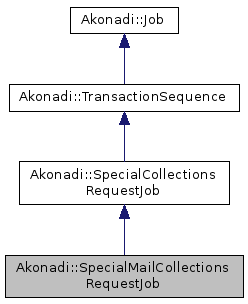akonadi
#include <specialmailcollectionsrequestjob.h>

Public Member Functions | |
| SpecialMailCollectionsRequestJob (QObject *parent=0) | |
| ~SpecialMailCollectionsRequestJob () | |
| void | requestCollection (SpecialMailCollections::Type type, const AgentInstance &instance) |
| void | requestDefaultCollection (SpecialMailCollections::Type type) |
 Public Member Functions inherited from Akonadi::SpecialCollectionsRequestJob Public Member Functions inherited from Akonadi::SpecialCollectionsRequestJob | |
| ~SpecialCollectionsRequestJob () | |
| Collection | collection () const |
| void | requestCollection (const QByteArray &type, const AgentInstance &instance) |
| void | requestDefaultCollection (const QByteArray &type) |
 Public Member Functions inherited from Akonadi::TransactionSequence Public Member Functions inherited from Akonadi::TransactionSequence | |
| TransactionSequence (QObject *parent=0) | |
| ~TransactionSequence () | |
| void | commit () |
| void | rollback () |
| void | setAutomaticCommittingEnabled (bool enable) |
| void | setIgnoreJobFailure (KJob *job) |
 Public Member Functions inherited from Akonadi::Job Public Member Functions inherited from Akonadi::Job | |
| Job (QObject *parent=0) | |
| virtual | ~Job () |
| virtual QString | errorString () const |
| void | start () |
Additional Inherited Members | |
 Public Types inherited from Akonadi::Job Public Types inherited from Akonadi::Job | |
| enum | Error { ConnectionFailed = UserDefinedError, ProtocolVersionMismatch, UserCanceled, Unknown, UserError = UserDefinedError + 42 } |
| typedef QList< Job * > | List |
 Signals inherited from Akonadi::Job Signals inherited from Akonadi::Job | |
| void | aboutToStart (Akonadi::Job *job) |
| void | writeFinished (Akonadi::Job *job) |
 Protected Slots inherited from Akonadi::TransactionSequence Protected Slots inherited from Akonadi::TransactionSequence | |
| void | slotResult (KJob *job) |
 Protected Slots inherited from Akonadi::Job Protected Slots inherited from Akonadi::Job | |
 Protected Member Functions inherited from Akonadi::SpecialCollectionsRequestJob Protected Member Functions inherited from Akonadi::SpecialCollectionsRequestJob | |
| SpecialCollectionsRequestJob (SpecialCollections *collections, QObject *parent=0) | |
| virtual void | doStart () |
| void | setDefaultResourceOptions (const QVariantMap &options) |
| void | setDefaultResourceType (const QString &type) |
| void | setIconForTypeMap (const QMap< QByteArray, QString > &map) |
| void | setNameForTypeMap (const QMap< QByteArray, QString > &map) |
| void | setTypes (const QList< QByteArray > &types) |
| virtual void | slotResult (KJob *job) |
 Protected Member Functions inherited from Akonadi::TransactionSequence Protected Member Functions inherited from Akonadi::TransactionSequence | |
| bool | addSubjob (KJob *job) |
| void | doStart () |
 Protected Member Functions inherited from Akonadi::Job Protected Member Functions inherited from Akonadi::Job | |
| virtual void | doHandleResponse (const QByteArray &tag, const QByteArray &data) |
| virtual bool | doKill () |
| void | emitWriteFinished () |
| virtual bool | removeSubjob (KJob *job) |
Detailed Description
A job to request SpecialMailCollections.
Use this job to request the SpecialMailCollections you need. You can request both default SpecialMailCollections and SpecialMailCollections in a given resource. The default SpecialMailCollections resource is created when the first default SpecialCollection is requested, but if a SpecialCollection in a custom resource is requested, this job expects that resource to exist already.
If the folders you requested already exist, this job simply succeeds. Otherwise, it creates the required collections and registers them with SpecialMailCollections.
Example:
- Since
- 4.4
Definition at line 72 of file specialmailcollectionsrequestjob.h.
Constructor & Destructor Documentation
|
explicit |
Creates a new special mail collections request job.
Definition at line 47 of file specialmailcollectionsrequestjob.cpp.
| SpecialMailCollectionsRequestJob::~SpecialMailCollectionsRequestJob | ( | ) |
Destroys the special mail collections request job.
Definition at line 82 of file specialmailcollectionsrequestjob.cpp.
Member Function Documentation
| void SpecialMailCollectionsRequestJob::requestCollection | ( | SpecialMailCollections::Type | type, |
| const AgentInstance & | instance | ||
| ) |
Requests a special mail collection of the given type in the given resource instance.
Definition at line 91 of file specialmailcollectionsrequestjob.cpp.
| void SpecialMailCollectionsRequestJob::requestDefaultCollection | ( | SpecialMailCollections::Type | type | ) |
Requests a special mail collection of the given type in the default resource.
Definition at line 86 of file specialmailcollectionsrequestjob.cpp.
The documentation for this class was generated from the following files:
Documentation copyright © 1996-2014 The KDE developers.
Generated on Tue Oct 14 2014 23:00:29 by doxygen 1.8.7 written by Dimitri van Heesch, © 1997-2006
KDE's Doxygen guidelines are available online.
 KDE API Reference
KDE API Reference